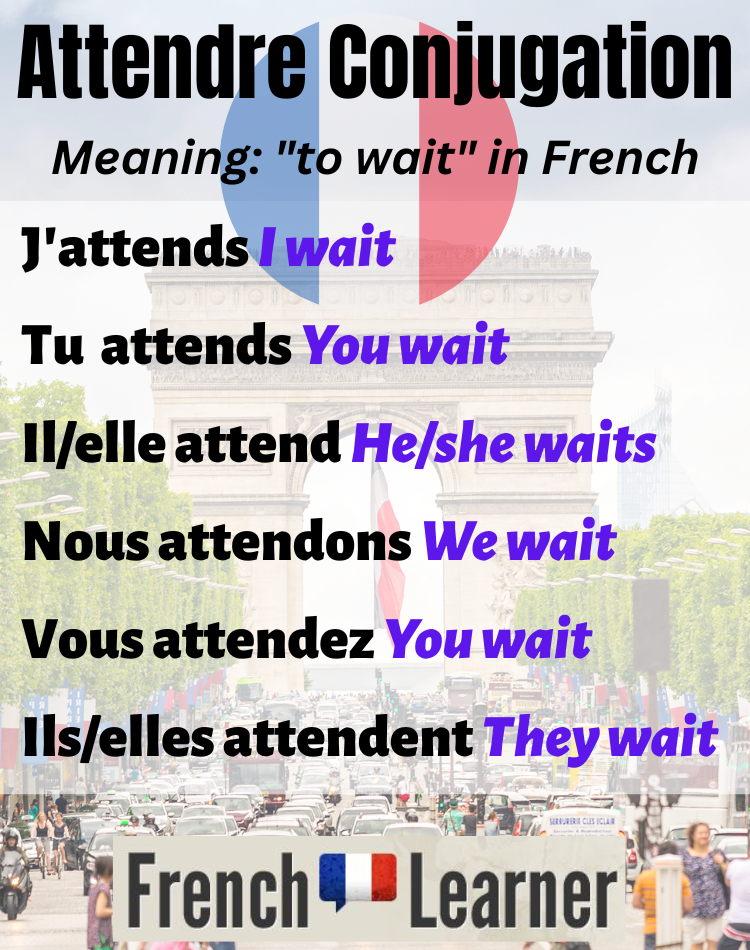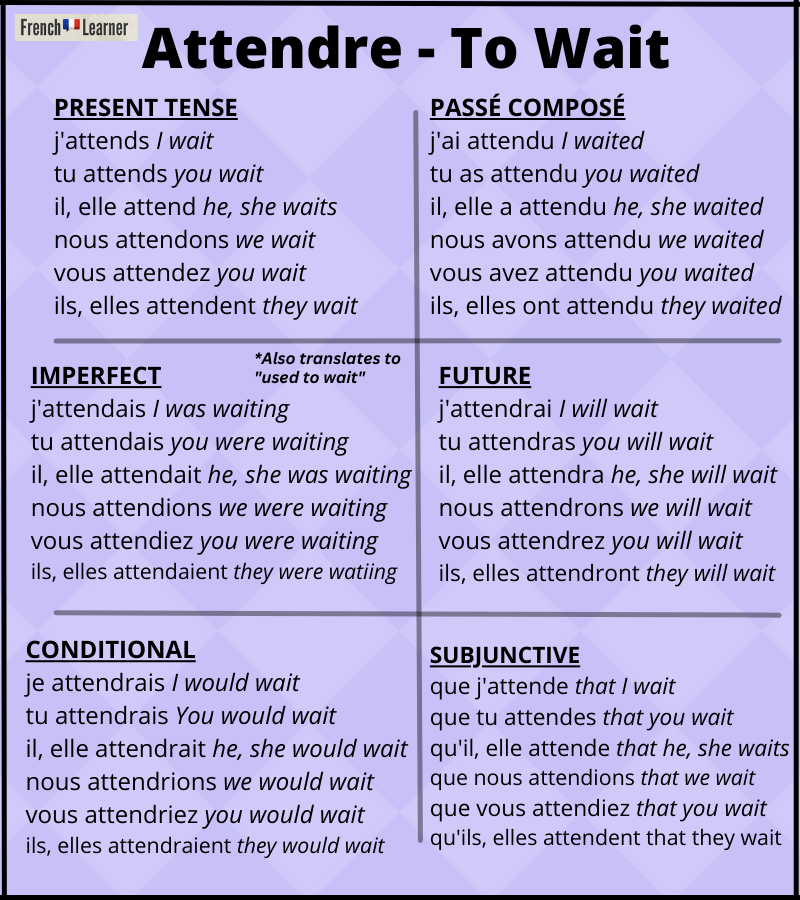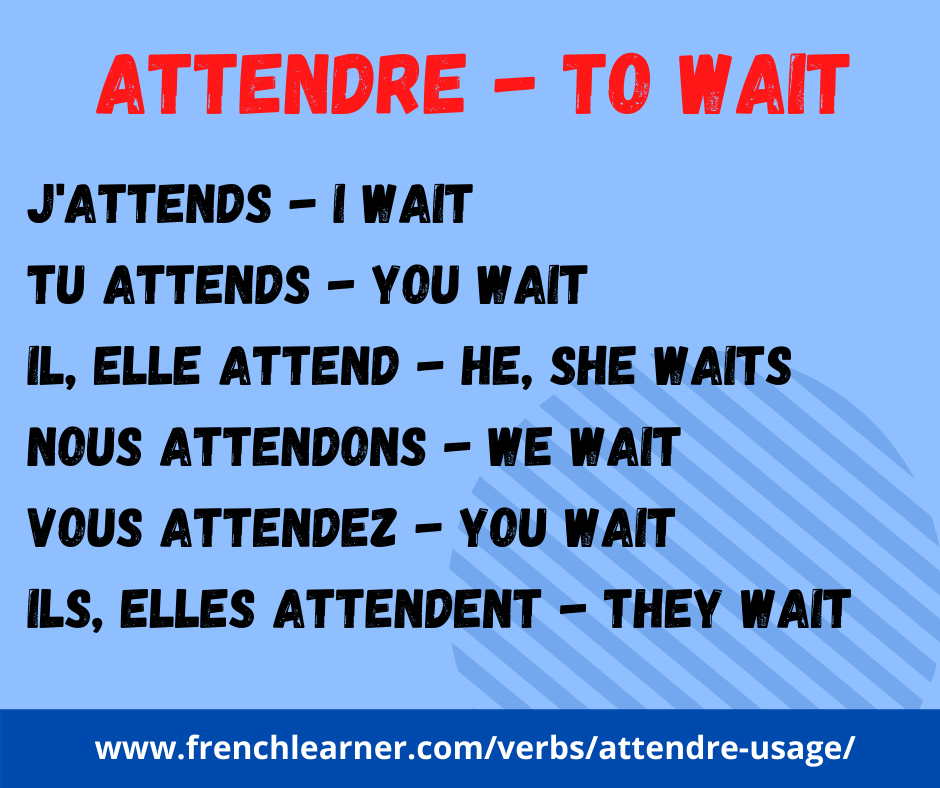The conjugation of attendre (Meaning: To wait; Pronunciation: atɑ̃dʀ) is J’attends (I wait), tu attends (you wait), il, elle attend (he, she waits), nous attendons (we wait), vous attendez (you wait) and il, elles attendent (they wait). Keep reading to find complete attendre conjugation tables with example sentences.

Attendre is a regular -re verb. This means that its endings are the same as all other regular -re verbs when conjugated in the present tense. Its endings in the present tense are -s, -s, -blank, -ons, -ez and -ent.
The past participle of attendre is attendu (waited) and the present participle is attendant (waiting).
This page provides conjugation table for attendre in the following major verb tenses:
- Present tense (le présent)
- Compound past (passé composé)
- Imperfect (l’imparfait)
- Simple future (le futur simple)
- Conditional (le présent du conditionnel)
- Present subjunctive (le subjonctif)
- Imperative (l’impératif)
How to use attendre
Attendre quelque chose / quelqu’un to wait for somebody or something
In French, the verb attendre is followed by a direct object. This means that while “wait” is followed by “for” in English, attendre is not followed by the preposition pour, which means “for”. For example:
- Marc attend Sylvie. Marc is waiting for Sylvie.
- Nous attendons le train. We are waiting for the train.
S’attendre à quelque chose to expect something
When appearing as a reflexive verb and followed by the preposition à, s’attendre à means “to expect”. For example:
- Je m’attends à un miracle. I expect a miracle.
- Marc s’attend à une reponse. Marc expects a reply.
Attendre conjugation table

Attendre conjugation charts
Present tense (le présent)
In the present tense, j’attends translates to “I wait” and “I am waiting”.
| J'attends | I wait | J'attends un ami sur le quai. | I'm waiting for a friend on the train platform. |
| Tu attends | You wait (informal, singular) | Tu attends un train dans la gare. | You're waiting for a train in the train station. |
| Il, elle attend | He, she waits | Elle attend ses amis. | She's waiting for her friends. |
| Nous attendons | We wait | Nous attendons les invités. | We're waiting for the guests. |
| Vous attendez | You wait (formal, plural) | Qu'est-ce que vous attendez? | What are you waiting for? |
| Ils, elles attendent | They wait | Ils attendent leurs cousins. | They're waiting for their cousins. |
In the following video, online French teacher Alexa teaches the pronunciation of attendre in the present tense.
Compound past (passé composé)
In the passé composé, j’ai attendu translates to “I waited”. The French use the passé composé to describe past actions which occurred at specific times.
| J'ai attendu | I waited | J'ai attendu tes amis pendant une heure. | I waited for your friends for one hour. |
| Tu as attendu | You waited (informal, singular) | Pourquoi est-ce que tu ne m'as pas attendu? | Why didn't you wait for me? |
| Il, elle a attendu | He, she waited | Elle a attendu mais tu n'est pas venu! | She waited but you didn't come! |
| Nous avons attendu | We waited | Nous avons attendu toute la famille devant la maison. | We waited for the entire family in front of the house. |
| Vous avez attendu | You waited (formal, plural) | Pourquoi est-ce que vous ne nous avez pas attendu? | Why didn't you wait for us? |
| Ils, elles ont attendu | They waited | Ils ont attendu une heure à l'aéroport. | They waited for an hour at the airport. |
Imperfect (l’imparfait)
In the imperfect tense, j’attendais translates to “I was waiting” or “I used to wait”. The French use the imperfect to describe past actions which occurred at unspecified times.
| J'attendais | I was waiting, used to wait | J'attendais mon ami quand j'ai eu les nouvelles. | I was waiting for my friend when I got the news. |
| Tu attendais | You were waiting, used to wait (informal, singular) | Est-ce que tu m'attendais longtemps? | Were you waiting for me for a long time? |
| Il, elle attendait | He, she was waiting, used to wait | Il s'attendait à une réponse pendant très longtemps. | He'd been expecting an answer for a very long time. |
| Nous attendions | We were waiting, used to wait | Nous n'attendions pas longtemps lorsqu'il est arrivé. | We hadn't been waiting long when he arrived. |
| Vous attendiez | You were waiting, used to wait (formal, plural) | Pendant combien de temps est-ce que vous nous attendiez? | How long were you waiting for us? |
| Ils, elles attendaient | They were waiting, used to wait | À quoi est-ce qu'ils s'attendaient? | What were they expecting? |

Simple future (le futur simple)
In the future tense, j’attendrai translates to “I will wait”.
| J'attendrai | I will wait | Je vous attendrai jusqu'à demain. | I will wait for you until tomorrow. |
| Tu attendras | You will wait (informal, singular) | Est-ce que tu attendras Sylvie? | Will you wait for Sylvie? |
| Il, elle attendra | He, she will wait | Je pense qu'elle attendra jusqu'à la semaine prochaine. | I think she'll wait until next week. |
| Nous attendrons | We will wait | Ne vous inquiétez pas, nous attendrons un peu plus si necessaire. | Don't worry. We will wait a bit more if necessary. |
| Vous attendrez | You will wait (formal, plural) | Est-ce que vous nous attendrez? | Will you wait for us? |
| Ils, elles attendront | They will wait | Je pense qu'ils attendront mais je ne suis pas certain. | I think they'll wait but I'm not sure. |
Conditional (le présent du conditionnel)
The French use the conditional tense to describe hypothetical events. J’attendrais translates to “I would wait”.
| J'attendrais | I would wait | Je vous attendrais si j'avais plus de temps. | I'd wait for you if I had more time. |
| Tu attendrais | You would wait (familiar, singular) | Tu attendrais Pierre s'il n'était pas en retard. | You would wait for Pierre if he weren't late. |
| Il, elle attendrait | He, she would wait | Il nous attendrait s'il n'était pas occupé. | He's wait for us if he weren't busy. |
| Nous attendrions | We would wait | Nous t'attendrions mais nous n'avons plus de patience! | We'd wait for you but we don't have any more patience! |
| Vous attendriez | You would wait (formal, plural) | Vous attendriez jusqu'à demain si c'était possible. | You would wait until tomorrow if it were possible. |
| Ils, elles attendraient | They would wait | Ils attendraient le taxi s'ils avaient plus de temps. | They' wait for the taxi if they had more time. |
Present subjunctive (le subjonctif)
The French use the subjunctive mood to express wishes, emotions and doubts. Que j’attende translates to “that I wait”.
| que j'attende | that I wait | Il faut que j'attende un peu plus. | I have to wait a bit more. |
| que tu attendes | that you wait (informal, singular) | Je veux que tu attendes Martin. | I want you to wait for Martin. |
| qu'il/elle attende | that he/she waits | Je doute qu'elle vous attende. | I doubt she's waiting for you. |
| que nous attendions | that we wait | Il faut que nous attendions jusqu'à demain. | We have to wait until tomorrow. |
| que vous attendiez | that you (formal, plural) wait | Nous exigeons que vous attendiez les invités. | We require that you wait for the guests. |
| qu'ils, elles attendent | that they wait | Il faut qu'ils nous attendent un peu plus. | They need to wait for us a bit longer. |
Imperative (l’impératif)
The French use the imperative to give commands. “Attend!” translates to “wait!”.
| Attends! | Wait! (informal, singular) | Attends! Je n'ai pas fini! | Wait! I haven't finished! |
| Attendons! | Let's wait! | Attendons un peu plus. | Let's wait a bit longer. |
| Attendez! | Wait (formal, plural! | Attendez-moi, s'il vous plaît! | Wait for me please! |


